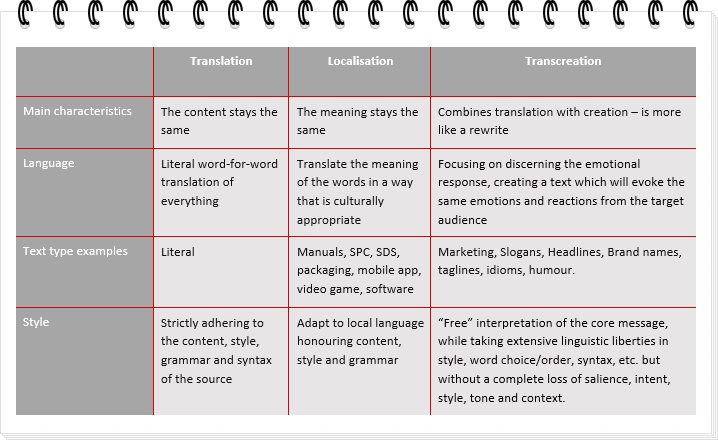What do you need and how do you choose?
The right choice depends on the purpose and nature of the translation, how it will be used to reach the target audience, the marketing objective of the advertiser and the financial resources of the company requiring the service. Choose the service which matches your needs. The following overview will hopefully help you decide whether your text needs to be translated, localised or transcreated.

Translation
What is translation? A very strict and plain definition of translation would be:
![]() The process of turning an original or source text into a text in another language.
The process of turning an original or source text into a text in another language.
Translation is a faithful and accurate adaptation of your text and is basically the literal interpretation of content from a source language into a target language, strictly adhering to the content, style, grammar, and syntax of the source, without any linguistic deviation from that source or any cultural adaptation of the target content.
Sometimes, you only need a literal translation to understand the content of a text, and therefore you do not need the translator to do a lot of work on the target text. In this case you should choose translation services.
Localisation (L10n)
What is localisation? To define localisation you could say that:
![]() Localisation is more than translation, but less than transcreation.
Localisation is more than translation, but less than transcreation.
If your company wants to attract customers globally, your manuals, SPC, SDS, pack copies, etc. would need to be localised rather than “just” translated in order to target your potential customers in a specific foreign market. In some cases EU requires, that your texts are made available to your customers in their mother tounge. In these cases localisation might be the best choice. It also depends on the type of product, local legislation and much more and requieres a close cooperation between the company and the translator.
Transcreation
What is Transcreation?
![]() Transcreation is a term used by advertising and marketing professionals and combines translation with creation, and is more like a rewrite in line with copywriting and creative translation.
Transcreation is a term used by advertising and marketing professionals and combines translation with creation, and is more like a rewrite in line with copywriting and creative translation.
It refers to the process of adapting a message from one language to another and expands upon translation by focusing not so much on the literal text, but on discerning the emotional response, creating a text which will evoke the same emotions and reactions from the target audiense. It is the process of taking a concept, sentences or message in one language and then re-create it in another. It might be a simple change in word/sentence order or even a complete rewrite of the source. It consists of a “free” interpretation of the core message of the source text, while taking extensive linguistic liberties in style, word choice/order, syntax, etc. without necessarily mirror-imaging the source content, but without a complete loss of salience, intent, style, tone and context.
Your choice
What should you choose?
![]() If you are converting scientific or highly technical materials into another language for a professional audience, you most likely will want a direct translation. If you need the text to be adapted to ex. local legislation then localisation is the right choice. When working with more nuanced materials where you want your message, brand and “voice” to be understood, such as with marketing or advertising collateral, and some websites or publishing materials, then transcreation is the right choice. Transcreation is ideal for content such as ad copy, slogans, headlines, tag lines or specific language elements like puns, idioms and humor. It is difficult for these types of content to retain their meaning and emotional intent when changing between languages. Let us know exactly what you need so we can provide you with a price that matches your needs.
If you are converting scientific or highly technical materials into another language for a professional audience, you most likely will want a direct translation. If you need the text to be adapted to ex. local legislation then localisation is the right choice. When working with more nuanced materials where you want your message, brand and “voice” to be understood, such as with marketing or advertising collateral, and some websites or publishing materials, then transcreation is the right choice. Transcreation is ideal for content such as ad copy, slogans, headlines, tag lines or specific language elements like puns, idioms and humor. It is difficult for these types of content to retain their meaning and emotional intent when changing between languages. Let us know exactly what you need so we can provide you with a price that matches your needs.
